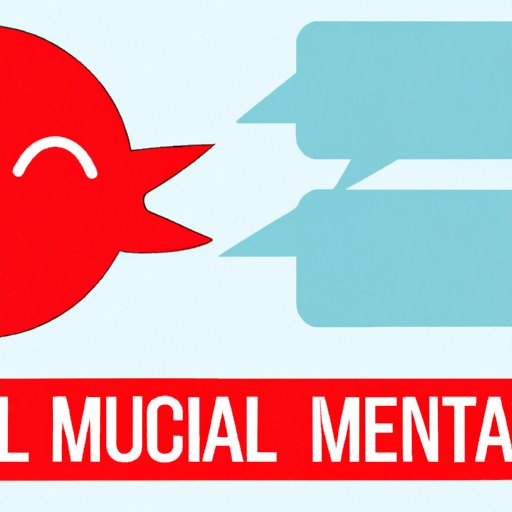
Introduction
Twitter is a great platform for staying up-to-date with news, trends, and conversations. However, it can also be overwhelming to encounter unwanted content or see too much of a particular topic. That’s where muting words on Twitter comes in. This guide will provide a detailed breakdown of how to mute specific words, the benefits of muting, commonly muted words and phrases, advanced tips, and the ethics of muting on Twitter.
Step-by-Step Guide to Muting Words on Twitter
The “Mute Words” feature allows you to block specific words, phrases, or hashtags from your Twitter feed. To use this feature:
- Go to your Twitter profile and click on “Settings and Privacy.”
- Select “Privacy and safety.”
- Scroll to the “Safety” section and click on “Mute words.”
- Enter the word, phrase, or hashtag you want to mute, and select whether you want to mute it from your home timeline, notifications, or both.
- You can also choose to mute the word for a specific time period or indefinitely.
- Click “Add” to save your mute settings.
It’s important to note that muting a word or phrase only prevents it from appearing in your feed and notifications. You can still search for and see these tweets if you choose to.
Benefits of Muting Words on Twitter
Muting words on Twitter can be a helpful tool for several reasons:
- Improved mental well-being: If a particular topic is causing you distress or anxiety, muting it can help you feel more in control of your social media experience.
- Filtering out unwanted content: Muting words can help you avoid spoilers for TV shows or sporting events, as well as block out hate speech or offensive language.
- A more enjoyable Twitter experience: By curating your feed to your liking, you can create a Twitter experience that is more tailored to your interests.
For example, if you’re a vegetarian and don’t want to see tweets about meat or carnivorous diets, muting those words can create a more positive environment for you on Twitter.
Commonly Muted Words and Phrases
Some of the most frequently muted words or phrases on Twitter include:
- Politics-related words and hashtags: During an election season or controversial political event, muting words related to politics can help create a more positive Twitter experience.
- Spoilers for TV shows or movies: If you’re a fan of a particular show but can’t watch it live, muting words related to that show can help avoid spoilers.
- Hate speech or offensive language: Muting words related to a particular hate group or discriminatory language can make Twitter a safer space for marginalized communities.
- Pop culture buzzwords: If you’re tired of seeing the same memes or catchphrases, muting those words can help create a more unique and interesting Twitter experience.
By muting these words or phrases, you can curate your feed to topics that are more relevant and enjoyable for you.
Advanced Tips for Muting Words on Twitter
If you’re an experienced Twitter user, you may want to personalize your muting options even further. Here are some tips:
- Block specific accounts: If you’re encountering unwanted content from a particular user, you can also block their account to prevent them from appearing in your Twitter feed and notifications.
- Use third-party tools: Some third-party Twitter apps offer more advanced muting options, such as muting based on account activity or specific tweet types.
- Experiment with keywords and phrases: Try using variations of a word or phrase to ensure you’re muting all potential unwanted content.
By experimenting with these options, you can create a more nuanced and tailored Twitter experience.
The Ethics of Muting Words on Twitter
While muting words on Twitter can be helpful in creating a more positive experience, it’s important to consider the potential ethical implications. Some arguments for and against muting include:
- Pros: Muting can improve mental well-being and create a safer experience for marginalized communities on Twitter.
- Cons: Muting can create echo chambers and prevent users from being exposed to differing opinions and perspectives.
However, it’s entirely possible to use muting in a responsible and ethical manner. By carefully considering which words to mute and why, users can create a more enjoyable and personalized Twitter experience without entirely shutting out differing views or perspectives.
Conclusion
Muting words on Twitter can be a helpful tool for improving mental well-being, filtering out unwanted content, and creating a more enjoyable Twitter experience. By following the step-by-step guide, exploring commonly muted words and phrases, and experimenting with advanced tips, users can create a more personalized social media experience. Remember, it’s important to use muting in a responsible and ethical manner to ensure a well-rounded social media experience.




